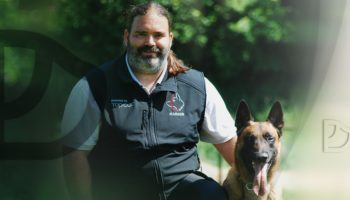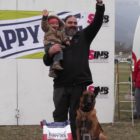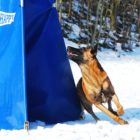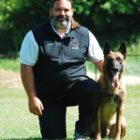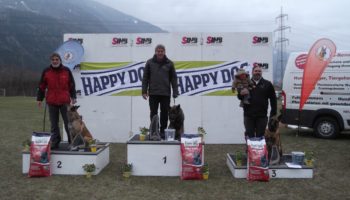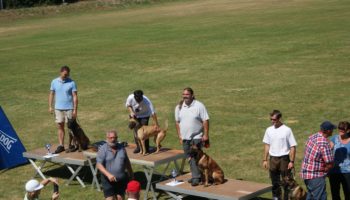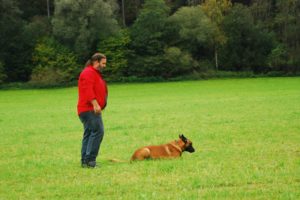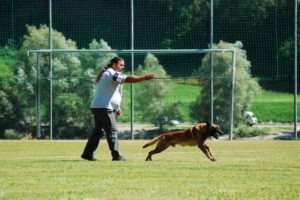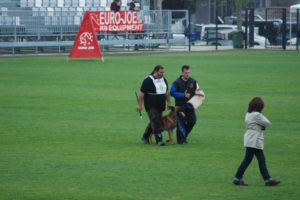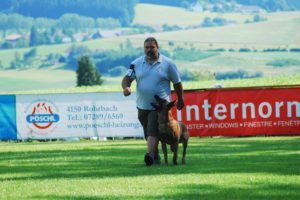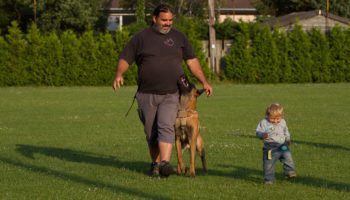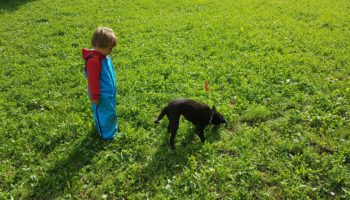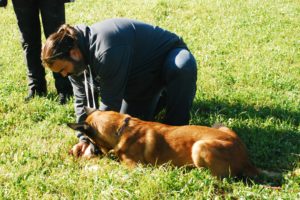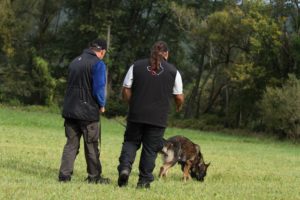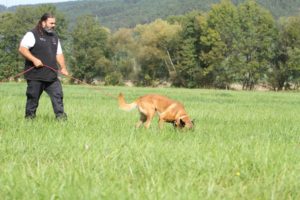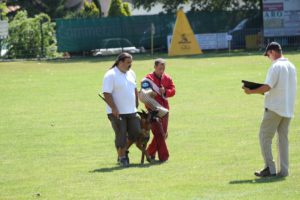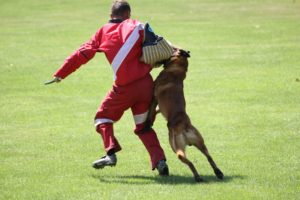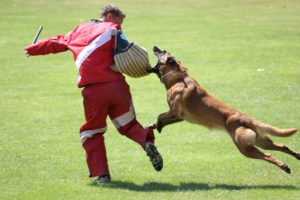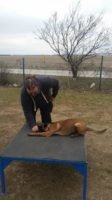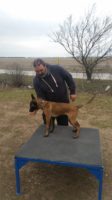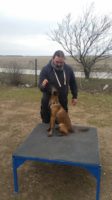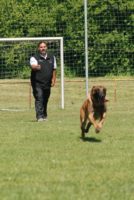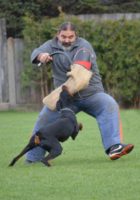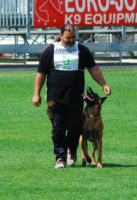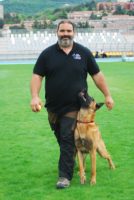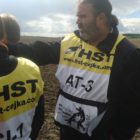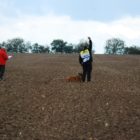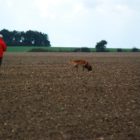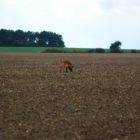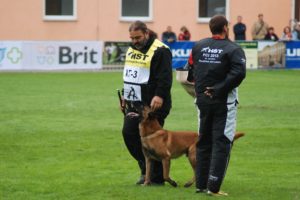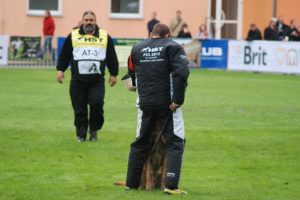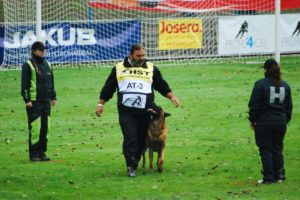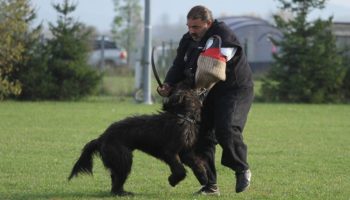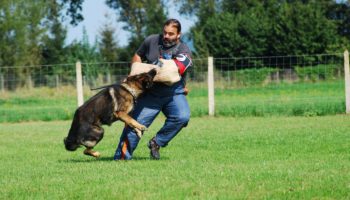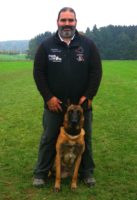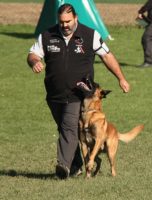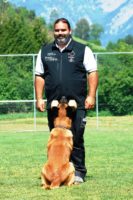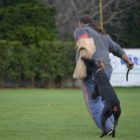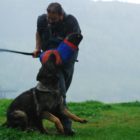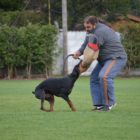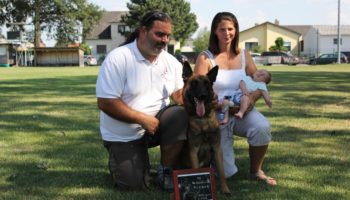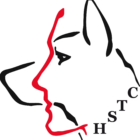Markus Mohr- Be Fair to Your Dog
Markus Mohr is Austrian trainer, helper and competitor. He lives in Austria, in a small town close to Vienna with his wife Lydia Mohr. They have two sons, Patrick and Stefan who are 5 and 3 years old. Markus is 44 years old and he works in the Logistic department of a helicopter maintenance service station
How did you actually get to dogs? Did you grow up in a dog-friendly family?
My aunt was the only one in our family, who had a dog and we played with him in my childhood. Then there were no more dogs in my life until I met my wife Lydia, who was already involved in dog sport and was a dog trainer. We got our first dog together about 17 years ago. It was a Golden Retriever called Akhiro. I attended the puppy class with him. That was my start into the dog world and we achieved SChH2 with him.
How did you get to dog sport? What were your beginnings like and who was you mentor and inspiration in training?
I used to go to the dog club with my wife just to watch. I usually sat in a corner with my laptop playing poker. But step by step I got more interested in what was happening on the field. I started to think about the training.
One day, I was in the club and the helper did not turn up so I was asked to get the sleeve on. The trainer brought me very, very old and heavy leather trousers and an old sleeve, and they let one dog after another go to do bite work on me. It was a lot of fun for everyone… For the dogs and for me. Due to problems with the other helper they asked me to do more helper work. So I started to attend helper seminars to improve. I was very keen to learn more about the subject. I also spent a lot of time working many dogs in different clubs to gain more experience. In the end, doing helper work was not enough for me, and I decided to get my own working dog. My cousin is a Malinois breeder. So I visited him and watched his dogs. I was really happy with that dog breed, because they were really clear minded. I got my first Malinos “Blade vom gelben Juwel” out of his second litter. I started to train in a different dog club with different rules. In this club, it was not necessary that the dog was that precise. However, I still wanted more. Therefore we changed our training to IPO. When Blade was about one year old, we went to our first seminar with Mario Verslype. That was my first contact with the IPO rules. Later on, I visited a seminar with Bernd Föry and I was really pleased with his work. After watching a lot of different seminars, we tried to find our own style of training.
How many dogs and what breeds have you had so far? What were your greatest achievements?
Our first dog was already mentioned Golden Retriever (Akhiro, SChH2), then I changed the breed and got my first working Malinois (Blade, IPO3) and one Dobermann (Cut, IPO3). Cut is now handled by my wife Lydia. I currently handle my young Malinois Gun vom Haus Mecki.
My greatest achievements are the 3rd place at the Austrian IPO National Championship, I participated twice in the “Best 12” (only the best dogs in Austria can compete to qualify for the FCI WCH in that trial) and I was competing twice at the World Championship with Blade. Together we qualified in 23 trials in IPO3.
Have you always wanted a Malinois? Why did you get your current dog Gun (Gun vom Haus Mecki)? Can you tell us something about him?
No, I really like to work with different breeds. I was even planning to get a Giant Schnauzer. But the bitch did not get pregnant.
Why I have chosen Gun… Blade was a very good sport dog for me. Very clear minded. He liked to work and he was very obedient. But at the end, I had some problems in bite work. He was never really serious in protection. So I tried to find a dog with more drive for protection. By a pure chance, I saw the litter of Wassilios Broumas, kennel vom Haus Mecki. The dam, “Zora vom Kistenstein” is closely related to Blade and the sire “Fyco van Tessinij´s” is an amazing working dog. So that´s why I decided to call Wasi and ask for a dog… And I´m really happy to work with Gun.
You are an experienced handler. Are you also involved in any dog sport organizations committees?
No, I like dog sport, but I´m not interested much in politics… I like to work on the competition field, not behind the desk.
As far as I know, you are working with clicker and motivational training. Has this always been so? Why did you abandon the “traditional” training methods?
We were never that “traditional” in our training and we never used any aversive tools in our club. I try to educate myself further. 20 years ago, we did not know what we know now…
Can you compare both styles, the traditional and positive training? What impact does each of them have on the dog and the handler? It is possible to combine them?
It depends on what you understand by “traditional” method… If it is bringing the dog to high drive, and then applying control using aversive methods? I think that it is a very common way in training IPO. What we do is the opposite. We teach the dog in low drive to have the dog in the right mind set to learn. Once the dog knows what to do, it´s time to increase the drive. We want high drive dogs with good attitude to work, but we don´t train our young dogs in high drive.
What do you think about proposed changes in IPO trial rules? Are they for better or for worse in your opinion?
There are many competent and good people thinking about the rules. I think they try to make the best for the sport. Of course, it is not easy to make everybody happy and some of the changes will be welcomed by some people and rejected by others. For me it is very important that the handlers will be informed about the changes as soon as possible, so they can adapt their training to the new rules.
You travel to different countries, what do you think about foreign trainers and helpers? Are they better than in Austria?
I cannot say if they are worse or better… They are different. We have a lot of very good helpers and trainers here in Austria. I´m very happy about that. I don´t have to be afraid when I compete at a trial, because all the helpers are well trained. Every helper, regardless of where he/she is from, has his/her own “style” of work. And that is fine, because you have to train your dog to cope with as many styles as possible.
What are the differences in styles of training and helper work? Are there any trends you noticed on you travels when it comes to dog training?
I´m lucky to see a lot of different trainings and helpers. I meet a huge variety of training styles, but it´s not easy to find a particular trend. Maybe, it was common in the past to see subdued dogs, but nowadays there is a tendency to have more highly motivated dogs. Which I think is a reflection of a more modern approach.
You have been attending IMPACT working dogs conference as a speaker in Great Britain. How did you find the event and what it was all about? IPO is not a popular dog sport in the country (GB), which may be surprising for some people.
Dave Hibbert invited me to do a presentation at the IMPACT 2017. I was really happy to participate there. We had two hours to show and present our style of protection training. It was the only IPO presentation there. At the end, we had a very good feedback from the participants.
I like this type of events, because they bring together many personalities of the dog world. Behaviourists, police dog trainer, sniffing dog trainer and so on. I´m sure it is very important to learn from other people to get better in your own training and such conferences are great places for sharing experience and knowledge.
How do you find the British dog sport, dogs and handlers? What is, in your opinion, the biggest issue in the UK when it comes to training?
Every country works according to the same rules, the IPO rules. So it is up to a particular dog club how the members decide to train. Therefore you can find a variety of approaches, some of them are more modern, and some are old fashioned. And this applies to the UK as well. But what I like is that people are starting to think about training more. The respect for their dogs is getting bigger. I´ve been to the dog clubs in the UK, where the handlers have very modern thinking. And that is very important for the sport because on the continent we often see that IPO people are deemed as hard and unfair handlers. So it´s good to see that some clubs in the UK are trying to use alternative ways of training.
You have your own IPO club – HSTC training centre. How and when did you get to run a club?
It´s been 10 years already since we started to run our own club. It was founded by my wife, me and one of our friends. We changed from a different organisation to ÖKV. In the beginning, we had just a very small field to train together. Later on, we had some clients to train their dogs. And now we are building our new field in Wiener Neustadt.
How many members do you have and is positive training popular in Austria? What breeds do you train at your club?
We are a small club with about 35 members. We try to train each dog very individually and that takes a lot of time. We train different breeds – Mali, GSD, Tervueren, Rottweiler, Dobermann and other. We also trained White Swiss Shepherds for IPO. The breed is not so important for us. I mean, although they may differ, at the end of the day they are all dogs. Training methods in Austria are very modern.
You have your system of training. Could you tell us a bit more about how you work with dogs and what methods do you use?
The respect for the dog is very important. The dog is my partner and we train together. Our trainings start with a detailed plan – that´s very important for the handler and the trainer, because the handler can concentrate 100 % on the dog. And the trainer also knows what to concentrate on.
We use our S.I.L. System (Small Increments Learning). What we do is to teach the dog every exercise first in very small steps. We do that in a low drive. So that the dog is in the right mind set to learn. That assures us that the dog is learning the behaviour properly, without any space for error. It means that there is less need for correction. If you teach a dog particular exercise properly, you do not need to use any corrections. Next step is that we start to increase the drive in a way that there would be no conflict in any part of the exercise. The dogs are very high motivated to work and make everything correct for their reward. Later, once the dog is ready for his “job”, the dog has the duty to do the exercise. At the end, we train behaviour proofing. We try to cover any eventuality. We are training any time in any place with many different distractions (music, people, toys…)
We use clicker as “keep going signals” (rather than shaping tools). But it is the handler, who will release the dog in the end of the exercise. So we teach the dog to work from the beginning of the exercise until its end. During this time, the dog should give us full attention, because it is very clear for the dog to know the beginning and the end of the exercise. But this will only happen if the handler gives his/her full attention to the dog. This is a very important part of the system. If we expect 100 % performance from our dogs, we also have to give them 100 % of attention and training.
Do you think it is possible to do IPO without positive punishment?
Positive punishment is present in the life of every dog and it is also present in the sport. Like the stick hits.
I think once you have taught your dog every exercise in a very modern or positive way, at some point you also have to teach your dog that there is a border. It is important to me that the dog knows what’s wrong and that he knows the correct answer.
What is the most important to you when you are training a dog? Is it the relationship with the dog or getting titles and winning?
Respect and fun for both the dog and the handler. Relationship and winning does not rule each other out. But I would not risk the relationship just for winning a title.
How difficult is it to qualify for the World Championships in Austria?
Each breed association has its own rules to qualify for the WCH. It is a little bit easier in some of them, but it´s not easy at all regarding the Belgian or German Shepherds.
To qualify for the FCI WCH you have to compete many times a year against about 70–80 dogs. It means you have to show a consistent performance throughout the whole year. Finally, you are allowed to compete at the “Best 12”, where only the best 12 dogs can participate. The best 5 finishing on the podium in this trial are qualified to go to the WCH.
Do you have your own kennel?
Actually, I´m not interested in breeding. There are so many good breeders out there.
What are conditions for breeding like in Austria? For example, dogs of working breeds in the Czech Republic usually have to pass breed specific ZTPs and trials as well as show grade and good health results. Is it the same in your country?
It depends on the breed. Each breed has different rules to be bred. If you want to breed a Malinois, you need good health results of a dog (HD, ED, and spine X-ray) and a DNA examination. You also have to pass an IPO1 exam or a ZTP. So the breeding association is responsible for that.
What other hobbies apart from dog sport and dogs do you have?
My family is my biggest hobby. I love to spend time with my two sons Patrick and Stefan! If there is some time left, I like going off riding with my motorbike to clear my head.
Christmas is coming. Do you have a tradition, a dish or anything, without which Christmas would not work?
Christmas is for me coming together with my whole family. We like to sit together chatting a lot and having a raclette grill barbecue. And I really like to build LEGO police and firefighter cars with our kids.
What are your plans for future?
I have no specific plans… I only would like to have fun in training and maybe we pass IPO3 with Gun with a nice score.
Have you got any message for our readers?
Be fair to your dog, have fun in training and be open minded.
I wish everybody a Merry Christmas and ALL THE BEST for the New Year! Thank you Markéta for this lovely interview!
Thank you very much for the interview! I wish you and your family Merry Christmas and Happy New Year!
Markéta Braierová
Edit: Eva Fiedlerová
Photo: author’s archive, www.facebook.com/HundeSportTrainingscenter; www.hstc.at
